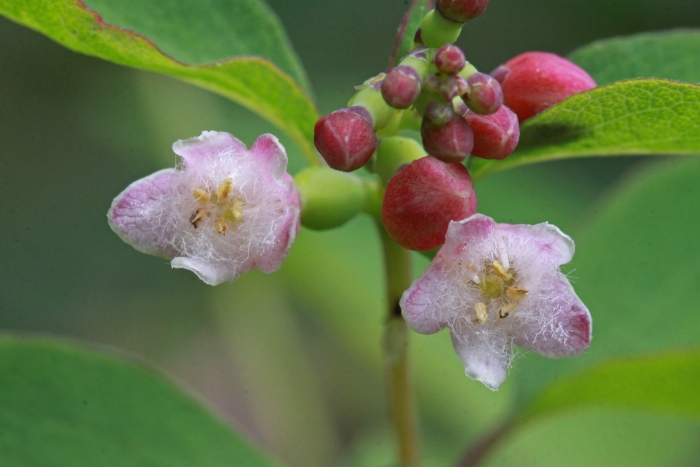Western Snowberry
(Symphoricarpos occidentalis)
Western Snowberry (Symphoricarpos occidentalis)
/
/

Andrey Zharkikh
CC BY 2.0
Image By:
Andrey Zharkikh
Recorded By:
Copyright:
CC BY 2.0
Copyright Notice:
Photo by: Andrey Zharkikh | License Type: CC BY 2.0 | License URL: https://creativecommons.org/licenses/by/2.0/ | Uploader: AndreyZharkikh | Publisher: Flickr |




















































Estimated Native Range
Summary
Symphoricarpos occidentalis, commonly known as Western Snowberry, is a deciduous shrub with a creeping habit, native to a variety of habitats including prairies, open woodlands, and along stream banks in the North Central USA and Canada. It typically grows to a height and width of 3 feet (0.9 meters), forming dense thickets. The plant features small, pink flowers that bloom in late spring to early summer, followed by spherical, white or pink-tinted berries that persist into winter, providing visual interest and food for wildlife.
Western Snowberry is valued for its hardiness and low maintenance, making it suitable for naturalized areas, wildlife gardens, and erosion control on slopes. It thrives in full sun to part shade and is drought-tolerant once established, preferring well-drained soils. This shrub can spread aggressively by root suckers, making it a potential problem in some areas where it may outcompete other vegetation. It is also used for restoration projects and as a bird food plant in habitat landscapes. Gardeners should be aware of its potential to spread and may need to manage its growth in smaller garden settings.CC BY-SA 4.0
Western Snowberry is valued for its hardiness and low maintenance, making it suitable for naturalized areas, wildlife gardens, and erosion control on slopes. It thrives in full sun to part shade and is drought-tolerant once established, preferring well-drained soils. This shrub can spread aggressively by root suckers, making it a potential problem in some areas where it may outcompete other vegetation. It is also used for restoration projects and as a bird food plant in habitat landscapes. Gardeners should be aware of its potential to spread and may need to manage its growth in smaller garden settings.CC BY-SA 4.0
Plant Description
- Plant Type: Shrub
- Height: 1-4 feet
- Width: 1-3 feet
- Growth Rate: Moderate
- Flower Color: Pink, White
- Flowering Season: Spring
- Leaf Retention: Deciduous
Growth Requirements
- Sun: Full Sun, Part Shade
- Water: Medium, High
- Drainage: Medium
Common Uses
Bee Garden, Bird Garden, Butterfly Garden, Deer Resistant, Drought Tolerant, Erosion Control, Fire Resistant, Groundcover, Hummingbird Garden, Low Maintenance, Street Planting
Natural Habitat
Native to prairies, open woodlands, and stream banks in the North Central USA and Canada
Other Names
Common Names: Wolfberry , Westamerikanische Schneebeere , Symphorine De L’Ouest
Scientific Names: Symphoricarpos occidentalis , Symphoricarpos occidentalis var. heyeri , Symphoricarpos heyeri , Symphoria occidentalis , Symphoricarpos occidentalis var. quercifolia
GBIF Accepted Name: Symphoricarpos occidentalis Hook.